Executive Committee Nominees
The elections for new Executive Committee members are now open; those elected will serve three-year terms, 2025-2028.
This committee takes a key role in advising a2ru staff in how we serve our mission and lead inter-institutional collaborations and thought leadership on behalf of the entire network. We partner with these individuals to enact new programs; we rely on these committee members to weigh in on how we spend a2ru’s resources, from staff convening time as how we allocate a2ru revenue and gift funds. They also coordinate leveraging external funds to resource both member schools and a2ru network activities aligned with a2ru’smission. The committee also works in monthly meetings to strategically chart the direction of the network’s activities.
Please vote for this year’s new Executive Committee members by clicking the link below. You may vote for up to three nominees. Voting is only open to a2ru members and will close on September 5, 2025.
The 2025 nominees include:
Steven Chodoriwsky, Assistant Professor of Multi-Disciplinary Design, University of Utah
 Biography
Biography
Steven Chodoriwsky is a Canadian designer, artist, writer, and educator. His research-centered practice engages with interdisciplinary arts spaces, performance platforms, and speculative acts of reading and writing with the built environment. His projects employ a diverse range of media including site-specific installation, workshops, publishing actions, theatre pieces, and audio-visual artifacts.
Based in Salt Lake City, he is Assistant Professor in the Division of Multi-Disciplinary Design at the University of Utah, where his research centers on experimental pedagogical models and their intersections with the institutional and spatial environments of the university campus. Prior to this, he taught at Cal Poly Pomona, Cornell, and at the University at Buffalo, where he held the Peter Reyner Banham Fellowship. He was educated in architecture at the Tokyo Institute of Technology and the University of Waterloo. He has also held extended art/design research positions at the Jan van Eyck Academie, Maastricht, and the Center for Contemporary Art, Kitakyushu.
Currently Artist-in-Residence at the Utah Museum of Contemporary Art, Chodoriwsky has exhibited and performed work at venues such as the Museum of Contemporary Canadian Art, de Appel Arts Centre, Amsterdam and the Suzuki Company of Toga International Theatre Festival, Japan, among many others. With curator Julie Niemi and designer Chris Lee he is a member of Collective Question, a research working group that studies structures of resistance through archives and exhibition production. As a writer, Chodoriwsky has contributed texts on spatial and cultural production to volumes of Scapegoat, San Rocco, C, and the Informal Market Worlds Atlas, among others. He is book designer of “Costume en Face” (Ugly Duckling Presse), co-editor/designer of “This is Not A Wall: Collected Short Stories of CODA’s Party Wall” (Cornell AAP/Actar), and is an independent publisher of experimental documents for organizations and events under the moniker Edits.
Nominee Statement
It’s an honor to be considered for service on the Executive Committee of the Alliance for the Arts in Research Universities. My interest in contributing to this unique space stems from my passion for bolstering educational experiences across the university community, with a particular attunement to how curricula and research practices shape, and in turn are shaped by, the built environment of campus.
The arts, and creative practices in general, are very much forerunners and natural innovators in this sense: they produce an extraordinary ecosystem of spatial practices: the resourceful ways we inhabit classrooms, organize events, structure schedules and collaborations, and apportion resources. This diversity transforms the straightforwardly educational into a series of intangible, unreproducible encounters, shared by its participants and their collective work.
Building upon my extensive experience as a design studio educator and out of professional experiences in architecture and visual/performing arts communities, I am eager to work with leaders across creative disciplines, and across a2ru’s network of campuses, to link the lived experiences of daily study to larger structural and institutional dynamics. This, in turn, speaks to my desire to support a2ru in how it responds promptly and confidently to larger societal, technological, and economic trends—trends that require a collective body of arts advocates to stay strategic, active, and on its toes.
As part of the a2ru Executive Committee I would be excited to add to the toolkit of its collective expertise through my work in the scholarship of pedagogy and the design of the built environment. Lastly I look forward to supporting the visibility, viability, and legibility of creative practices across the spectrum of university knowledge production.
Oṣubi Craig, Director, Center for Arts, Migration, and Entrepreneurship, University of Florida
 Biography:
Biography:
Oṣubi Craig is a multi-talented musician, arts administrator and engineer with comprehensive experience as an arts integration advocate, an education facilitator, ensemble director, and African Diasporic percussionist. Oṣubi brings a great deal of experience and energy to his role as the director of the Center for Arts, Migration, and Entrepreneurship (CAME) in the College of the Arts at the University of Florida (UF).
As a third-generation percussionist growing up in Brooklyn, NY, Oṣubi was immersed in the emerging African Diasporic cultural arts movement. His passion for science and technology led him to earn a B.S. degree in Industrial Engineering while minoring in Jazz Studies at Florida A&M University (FAMU). Oṣubi went on to earn an M.A. from Florida State University in Arts Administration. As an artist, he worked for major performing arts organizations, such as the Alvin Ailey American Dance Theater and National Dance Institute’s Arts-in-Education programs, served as lead drummer for Kulu Mele African Dance & Drum Ensemble (Philadelphia, PA), and was a teaching artist for the Philly Pops (Philadelphia, PA), NJPAC (Newark, NJ), Lincoln Center Institute Arts-in-Education program (New York, NY) and Urban Bush Women (Brooklyn, NY).
In his 20 + years of experience as an Arts Administrator, he has a proven track record of creating and implementing programming, cultivating community partnerships, crafting shared visions and strategic directions, and working effectively with partners within the Arts, higher education, and greater community.
He is a founder of SPARC352, a project of CAME and the UF Center for Arts in Medicine, which collaborates with researchers and community members to provide arts programming to the community to improve health and wellbeing outcomes.
In his role at UF, he was recognized with the Win Phillips Town and Gown Award for his work fostering relationships between the community, creatives and researchers to utilize the arts for positive social change. Additionally, Oṣubi has served as the college representative on the UF Council of Research Associate Deans (CORAD). His current research is a Robert Wood Johnson foundation supported partnership called Atunda, a collective of dancers and researchers using blockchain technology to protect the IP rights of dancers and choreographers.
Nominee Statement:
I am again honored by this nomination opportunity to further serve on the Alliance for the Arts in Research Universities as a member of the Executive Committee. I appreciate the organization’s forward-thinking vision on arts in higher education and its desire to connect artists and scholars in ways that will shape the future of the arts and their role in the research apparatus of university culture. My role as the Director of the Center for Arts, Migration, and Entrepreneurship (CAME) is focused on exploring new models of research, innovation, and community engaged scholarship that equitably compensate artists–especially those in diasporas– and work toward making them more central to the university’s research, programming and partnerships. This sits squarely within the mission space of a2ru. CAME’s research agenda brings a new and vital perspective on arts integration, with projects that are leading conversations about how to integrate arts and AI technology, co-creating community-generated innovations at the unique intersection of the arts, entrepreneurship, and the creative economy. CAME is a hub of aligned organizational partners and communities across the world, all working to invest in capacity building and global networking. As the leader of the Center and in the field of higher education arts administration, I have connections to artists across the globe, the National Council of Arts Administrators, grant-makers, arts presenters, gallery curators, and higher education administrators at all levels. The knowledge and expertise I bring as an artist, administrator, and engineer have been extremely valuable and relevant to A2ru. My experiences working at an R1 university as well as HBCUs and access institutions allow me to bring multiple perspectives to these conversations. My connections with and experience working in HBCUs would be of great value as a2ru continues to work to broaden its membership base. A2ru is doing work to help shape the next generation of artists, arts administrators and scholars. I am excited to have an opportunity to contribute to that work. — Oṣubi I. Craig
Katie Dawson, Associate Professor, Drama and Theatre for Youth and Communities, University of Texas at Austin
 Biography:
Biography:
Katie Dawson uses the arts to increase equity, access, and belonging in learning. She is an associate professor at The University of Texas in Austin, where she heads the MFA in Drama and Theatre for Youth and Communities and directs the Drama for Schools program. Katie is a UT Provost’s Teaching Fellow and heads Creative Collaborations for UT’s Planet Texas 2050, a transdisciplinary research project focused on climate resiliency and adaptation. Katie’s research and teaching has been acknowledged by multiple awards from her university and the American Alliance of Theatre and Education’s Winifred Ward Scholar Award, the Creative Drama Award, and a Distinguished Book Award.
Katie is a global thought leader and researcher on the impact of arts integration in education. She has multi-year research-practice partnerships with government and university leaders in Taiwan, Hong Kong, China, and Australia that investigate how to use drama to increase engagement in learning through culturally sustaining pedagogies. She has been awarded twelve grants from the U.S. State Department to run multiple projects with the U.S. Embassy system, local NGOs and interethnic educators in Bosnia and Herzegovina, Poland, and Croatia that use the arts to expand critical thinking and perspective taking in education. Katie has twenty years of experience leading major research initiatives on arts integration in K-12 education, in rural, urban, suburban, and borderland communities in the U.S. Currently, Katie is partnering with K-12 students and educators in Texas to re-design and research arts-integrated school curriculum focused on climate resilience. Katie’s co-authored books include: The Reflexive Teaching Artist: Collective Wisdom from the Drama/Theatre Field and Drama-Based Pedagogy: Activating Learning Across the Curriculum. Her new book, Drama for Schools and Beyond: Transformative Learning Through the Arts will be distributed by University of Chicago Press in September 2025.
Nominee Statement:
As an interdisciplinary academic and researcher, I build new bridges between the arts and education, schools and communities, and students and teachers. Specifically, I explore how arts integration can be used to improve education and to support educators and students to flourish across political, cultural, and disciplinary divides. I am deeply curious about the arts’ productive capacity to prompt and mediate discovery in learning. As a new member of the a2ru Executive Committee, I will bring my twenty years of arts integration experience on four continents to the immediate questions of our organization and field. In this time of socio-political precarity, I am particularly eager to work with like-minded colleagues to consider how a2ru might engage with global research universities, to follow bell hooks lead and use the arts “to imagine what is possible.”
The 2026 nomination process for new Executive Committee members will open next spring. If you are interested in nominating yourself or a colleague for the a2ru Executive Committee in a future election cycle, please contact a2ru Executive Director Maryrose Flanigan at flanigam@umich.edu.
